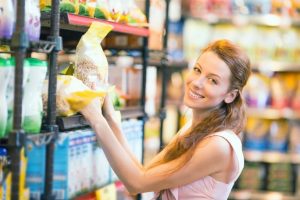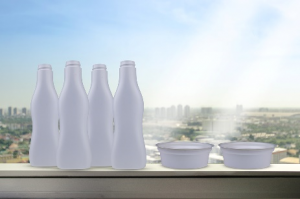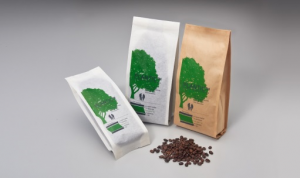In the current drive to make all plastic packaging reusable or recyclable, environmentally friendly packaging with barrier coatings such as EXCEVAL™ make this goal achievable.
The Kuraray POVAL team will be showcasing solutions for the paper industry at Specialty Papers US in Milwaukee, September 30 – October 2. Visit us there and read down for more details on the challenges, and the innovative solutions, for the Industry.

“It’s important to find alternatives to plastics to reduce waste packaging,” says Heiko Mack, Head of Poval Business at Kuraray. “Barrier coatings like our EXCEVAL™ copolymer help create recyclable packaging solutions such as paper-based food packaging.”
Plastic waste is putting an increasing strain on the environment. The use of plastic packaging for food and other products plays a big role in that. In the European Union, to reduce the associated waste, the aim is to ensure that by 2030 all plastic packaging is reusable or recyclable. Heiko Mack heads the Polyvinyl Alcohol (PVA) business unit at Kuraray, one of the world’s leading specialty chemical producers. In this interview at the 2019 Specialty Papers Conference in Berlin, he explains how EXCEVAL™ barrier coatings can contribute to environmentally friendly packaging solutions.
Mr. Mack, by 2030 all packaging in the European Union (EU) should be reusable or recyclable. Is that achievable?
Heiko Mack: It has to be! The rising strain on the environment caused by plastic packaging is a major challenge at present. Therefore, the circular economy, which the European Union launched with an action plan back in 2015, is an important step.
What basic conditions need to be met?
Heiko Mack: The packaging industry needs to find alternatives to plastic. Paper-based packaging is one option. Using high-performance barrier coatings such as our EXCEVAL™ copolymer, it is possible to create innovative packaging materials that are superior to plastics in many ways.
How does that work?
Heiko Mack: EXCEVAL™ is an aqueous solution that is used to coat packaging materials. That makes them impermeable to grease and oil and acts as an effective gas barrier. Contact with oxygen causes oxidation of many foods, which affects their colour, consistency and taste. A barrier coating keeps oxygen and carbon dioxide out of the pack.
So the packaged food stays fresh and edible for longer.
Heiko Mack: Exactly. EXCEVAL™ has been used as a gas barrier in plastic packaging for many years. It is now also being used more frequently as an oxygen barrier in paper packaging. And that is good news because EXCEVAL™ does not contain solvents or chlorine. Unlike coatings based, for example, on acrylic latex, EXCEVAL™ is completely biodegradable in water. In combination with paper, it is an environment-friendly alternative to conventional food packaging …
… and reduces packaging waste?
Heiko Mack: In Europe, more than 70 percent of waste paper is currently recycled, compared with less than a third of plastic waste. One reason is that recycling waste paper is far easier. Economically, it often makes better sense than recycling plastics. EXCEVAL™ enables producers to increase the functionality of paper. And coated paper containing up to 5 percent EXCEVAL™ can simply be disposed of via the paper recycling process.
There are strict regulations on food packaging. What applications is Exceval suitable for?
Heiko Mack: EXCEVAL™ meets the highest food safety requirements. EXCEVAL™ coatings are approved for applications where they come directly into contact with food. For example, it meets the strict requirements of the US Food and Drug Administration. It also meets the criteria defined by Germany’s Federal Institute for Risk Assessment.
From 2021, single-use plastic products will not be permitted in the EU. Can EXCEVAL™ play a part here as well?
Heiko Mack: Definitely. EXCEVAL™ offers ways of replacing single-use plastic products in the future. For example, its water-repellent properties mean it can be used as an adhesive for paper drinking straws. It also has processing benefits: EXCEVAL™ has very good film-forming properties and is suitable for many commonly used printing and coating processes. We market this product in various modifications, viscosities and hydrolysis grades designed specifically for different applications.
Kuraray’s product range includes other high-performance barrier materials …
Heiko Mack: One example is EVAL™, which was one of the first barrier copolymers and is still the market leader. It can be used flexibly in many processes such as co-extrusion and co-injection processes. As a monolayer, it is also suitable for laminating processes. Another barrier material is PLANTIC™.
Kuraray’s starch-based biopolymer?
Heiko Mack: Yes, Kuraray’s subsidiary Plantic Technologies Limited markets PLANTIC™ packaging material with excellent gas barrier properties. Sustainability is the keyword here. This biopolymer does not contain any artificial plasticizers and is around 80 percent starch. That means it is fully biodegradable. Another important aspect is that it is produced entirely from raw materials that are not genetically modified.
What developments do you expect to see on the market for packaging and specialty papers in the future?
Heiko Mack: Discussions such as those we have had at the Specialty Papers Conference this week show a clear trend towards paper with barrier properties. I expect many new products to come onto the market in this field in the next few years. EXCEVAL™ is a product that meets the packaging industry’s rising demands. We provide advice and assistance for our customers, for example, in the development of new formulations for specialty papers. That means we are always very close to the market.
About Heiko Mack
Since 2014, Heiko Mack has been head of the Polyvinyl Alcohol (PVA) business unit at Kuraray, one of the world’s leading specialty chemicals companies, which is based in Tokyo, Japan, and has its European headquarters in Hattersheim, near Frankfurt am Main, Germany. As Head of the Poval Business, Heiko Mack’s product responsibilities include Kuraray POVAL™, ELVANOL™, EXCEVAL™ and MOWIFLEX™.
More about the products:
The perfect barrier to keep oxygen out: effective, printable, sustainable. Kuraray’s barrier products EXCEVAL™, EVAL™ and Plantic™ give food packaging a functional barrier to keep oxygen at bay. In this way, they increase the shelf-life of food and help to reduce waste. The specific properties of these products make them suitable for range of different applications:

Less plastic on supermarket shelves: “EXCEVAL™ gives paper packaging an excellent barrier to oxygen, grease and oil. And packaging containing up to 5 percent EXCEVAL™ can be disposed of simply via the paper recycling process, says Heiko Mack, Head of Poval Business at Kuraray. By 2030, all plastic packaging in the EU will have to be recyclable or reusable.
EXCEVAL™ – the biodegradable coating for sustainable packaging
- • EXCEVAL™ gives plastic and paper packaging an excellent barrier to oxygen, grease and oil.
- • This ethylene vinyl alcohol copolymer is supplied as an aqueous solution, so coatings are easy to apply.
- • EXCEVAL™ is biodegradable in water, free of chlorine and solvents, and meets the demanding requirements for food-contact use.

EVAL™ offers advantages in recycling: adding 10 percent PP-EVOH recycling material from industrial sources to recycled PCR-PP or PCR-HDPE from domestic refuse collections does not affect food-safe cleaning, further processing or physical properties compared to PCR-PP or PCR-HDPE alone.
EVAL™ – the first and leading barrier material
Thanks to EVAL™’s outstanding barrier properties, even an extremely thin layer of just four micrometres keeps oxygen out of food packaging, so the food stays fresh and keeps its aroma for longer. This barrier resin can be processed in co-extrusion and co-injection processes. As a monolayer film, it is also suitable for laminating processes. Even a very thin layer of EVAL™ is a very effective barrier. That reduces the weight of food packaging and the inputs used to produce it.

Completely sustainable packaging: PLANTIC™ biopolymer is biodegradable and contains more than 80 percent renewable starch. Its excellent barrier performance keeps out oxygen and makes sure the flavour and aroma of coffee, snacks and sweets stay inside the packaging.
PLANTIC™ – the fully sustainable packaging solution
- • PLANTIC™ biopolymer contains 80 percent starch.
- • PLANTIC™ is completely free of artificial plasticizers and is fully biodegradable.
- • As a barrier material, it gives packaging an effective gas barrier.
- • Laminated onto paper, PLANTIC™ allows the creation of high-performance, fully biodegradable packaging.

